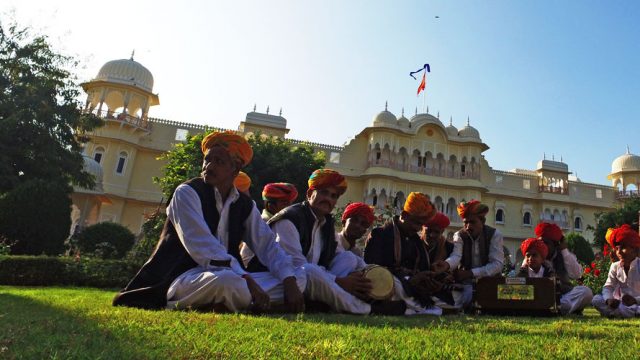“That amphitheatre we built is not dying, it’s not going anywhere; and every single generation of my family will have to put it to use,” said the visibly zealous Abhimanyu Alsisar, titular prince of the royal Alsisar family of Shekhawati, as he sat in the lawns of the majestic Nahargarh Palace to have a conversation with us. He was referring to the Puqar Open Air Amphitheatre that was built in a record 100 days to showcase the talent of local Rajasthani musicians at the first ever Ranthambore Festival held from 27–29 January at the palace. Although the idea of the festival came to Alsisar and Ashutosh Pande (of Bajaao.com), about four years ago, it was Rajasthan Chief Minister Vasundhara Raje who suggested they merge the theme of wildlife conservation with music to make for an unparalleled cultural extravaganza.

Hence started a journey of 3,800 kilometres across the districts of Jaisalmer and Barmer, spanning over a period of 13 days, to “handpick every single artist” that played at the festival. Alsisar and Pande travelled across the state to find 35 local artists to showcase Rajasthan’s rich cultural heritage and documented their stories. Eventually, they roped in Ustad Ma Zila Khan who selected a few more artists to perform at the festival, while finally giving it a concrete form.

With art souks, wildlife film screenings, mouthwatering food, hot air balloon rides, heritage walks, tiger safaris and music and photography workshops, the first day of the festival started on a grand note with the Rajasthan Chief Minister inaugurating it. While ‘Into the Wild’, the wildlife film festival, showcased films on nature conservation curated by CMS Vatavaran at the palace lawns throughout the day, the Puqar Amphitheatre was mostly busy with music and photography workshops. The palace’s poolside played host to an array of interesting activities such as interactive drum circles, cookouts and even a Mongolian throat singing workshop held by Pause & Effect, an organisation that offers alternative wellness getaways around Mumbai. Although the activities held by the poolside did seem to slightly take away from the Rajasthani ‘feel’ that the festival aimed at, it nonetheless helped in creating the vibe of a destination cultural festival, far away from one’s home, in a world so different and immersive.
The Puqar stage held music appreciation workshops by pioneering artists such as Karl Luchmayer and Zila Khan. It also hosted performances by local Rajasthani musicians. Additionally, the stage also held photography workshops by famous wildlife photographers, such as Aditya ‘Dicky’ Singh, who have regularly worked in the Ranthambore National Park.

The Rajasthani fold musicians that performed at the festival include Ustad Hakim Khan, who is one of the last kamaicha players in the world. Khan mesmerised with a performance of the six different ragas of Hindustani classical music that had emerged from of the 400-year-old instrument made out of mango tree wood and goat leather.
The highlight at the festival, however, were the evening performances held at the Haathikund stage. While The Police Band delivered some popular Bollywood music and Rajasthani fold music in their own style, the Mumbai-based Neeraj Arya’s Kabir Café blended Kabir’s dohas with Malwani music and gave a soulful performance that held everyone in a trance. Pianist Karl Lutchmayer, the indie folk band Maati Baani and dancer Mallika Sarabhai all performed here. Sarabhai’s dance troupe showcased the dance form of kuchipudi, along with other indigenous folk dances. Zila Khan, with her rendition of Sufi music, stole everyone’s heart.

The second and main day of the festival ended with the screening of a documentary called The Unforgotten Music of Rajasthan, which was shot during Alsisar and Pande’s journey through the state. It featured stories of Rajasthani musicians, most of who have travelled across the world to showcase their rich musical heritage on international platforms, but prefer coming back to the state to ensure that their tradition stays alive. It is in their dreams that this festival truly sees its future. And it is also their dreams that this festival aims to serve.




